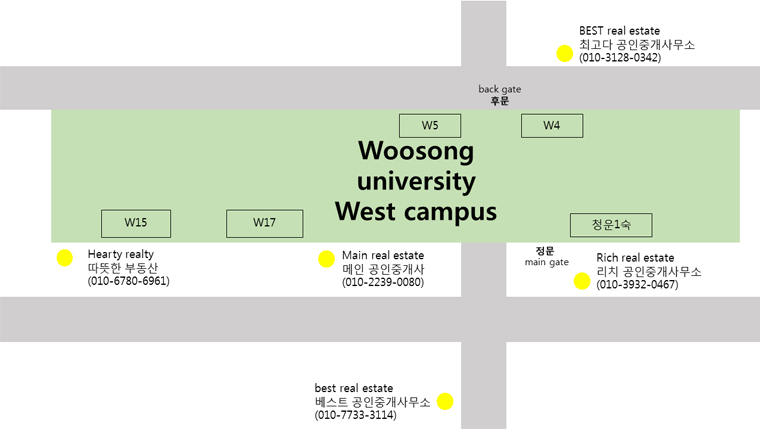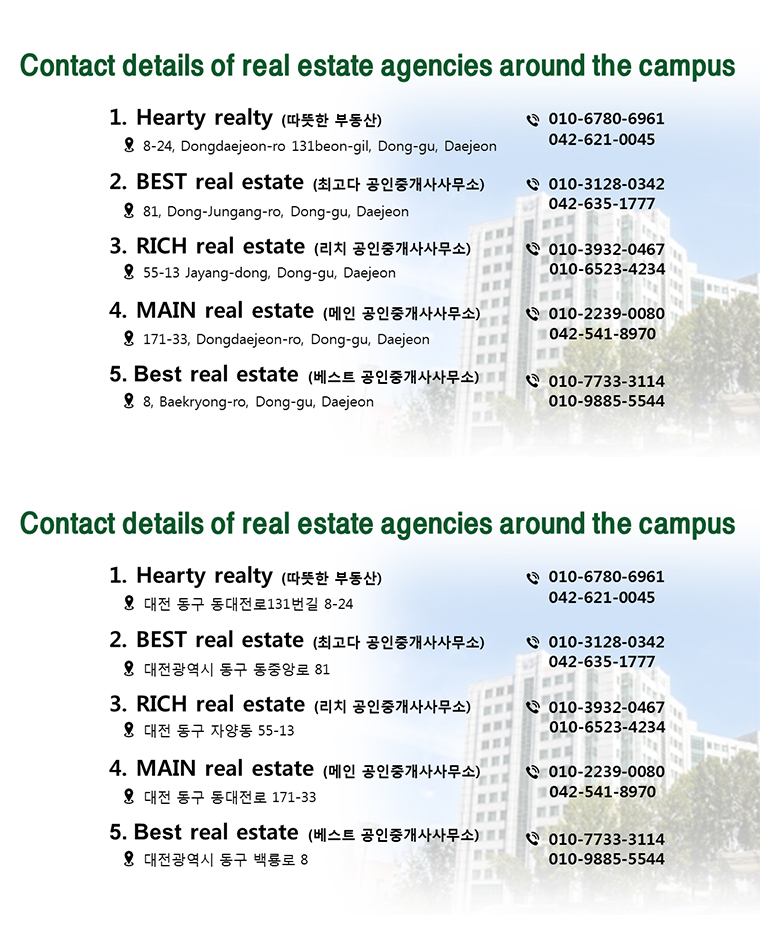Off-Campus Residences
Off-Campus Residences
Real Estate Agency Information
Guidance support for outside residences: Information on International Student Support Team operation
- Support Team formation (International Student Support Team): Administrative staff (main officer), English-speaking administrative intern, and Chinese-based administrative intern may help international students looking for rooms outside.
- Information on real estate in the vicinity of the school, information on the type of residence such as studio apartments and multi-households, etc. are mainly focused on about five foreign language-enabled real estate companies.
- Educational information is needed for safe contracts (*Additional educational materials will be available considering the current risk of damage to international students such as charter fraud)
Room Related Information


- Various range of deposit, monthly rent, and lease of studio apartments, houses, and multi-family houses depending on the construction year
- In the case of students in Vietnam and Central Asia, they rent studio apartments and multi-family lives for 1~4 persons
Types of Residences
In Korea, typical types of residences are detached houses, apartments, studios (called 'officetel' in Korea), multiplex houses, and multi-household houses (etc.). These days Koreans who live in cities prefer to live in multi-unit dwellings, such as apartments, for the sake of convenience. Koreans place great importance on housing. In Korea, the price of housing is very expensive, and houses in metropolitan areas are far more expensive than those in rural areas.
Utility Cost Information
Internet, water, maintenance, electricity, garbage, etc.
In some cases, payment for user-specific claims or monthly maintenance fees are included.
Waste Disposal Method
Separate collection, garbage bag, food waste disposal method
In some cases, it is handled by a building manager, including a user's self-organization or management fee.
Personal Internet Application:
- Individual Application
Reporting Changes of Information:
- HiKorea Address Change Declaration
- Reporting period: Within 14 days from the date of change occurred
- Required documents: Passport & Alien Registration Card (ARC), Application form, Additional documents that prove the change
In case of the change in place of residence
- Changes in the place of residence must be reported within 14 days of the occurrence as well. It can be done at the nearest community service center (Dong or Gu Office)
- Required Documents: Proof of Residency
- Living off-campus: Submit the copy of the rental contract.
- If the contract is not under the applicant’s name, it is required to submit the copy of accommodation provider’s ID card & ‘Confirmation of Residence/Accommodation’.
Checklist When Looking for Housing
There are many ways to search for a house in Korea. Although using fliers on the street and visiting advertised places in person is one method, the most common method is to use a real estate agency. If you use a real estate agency, an agent will find housing that meets your qualifications and prepare necessary documents for you. By going through a real estate agent, you will be able to make a safer contract and avoid any future legal problems. Real estate agents charge a commission fee based on the house price, so it is advisable to check the brokerage fee on the Internet in advance.
※ Currently, most real estate brokerage fees are based on the value of the transaction. If a real estate agent claims an excessively high fee, you should report it to an illegal brokerage activity report center.
Rental Contracts
Contract Counterpart
Rental contracts must be made with the actual owner of the house. In the contract, the lease period, deposit amount, monthly rent amount, and other important information must be specified. In the case of subletting or taking over a contract from a previous tenant, be cautious of giving large deposits. Since you are not making a contract directly with the owners, the owner is not obligated to give you your deposit back if he/she does not agree with the contract.
Before entering into a contract, it is imperative that you check the identity of the house owner, and check the required documents of the owner or the owner’s official representative (authentication certificate of one’s seal, letter of delegation). The identity of a house owner can be verified by examining a certified copy of the person’s real estate register, which can be easily obtained on the Internet. It is good to check the real estate register several times throughout the process: before making your down payment, interim payment, and final payment.
Register your contract to registry office
Checking the real estate register before entering into a contract is just as important as seeing the house in person. The register contains the address of the house, the name of the landlord, and the total area and other structural details, and also gives information regarding whether the landlord owns the building outright or is paying a mortgage. A certified copy of the register can easily be issued online at www.iros.go.kr without visiting the registry office. Since this is an extremely important part of the house rental process, be sure to ask a Korean friend or colleague for assistance if you are unable to access the register yourself.
Down Payment and Deposit
A down payment is not required by law, but people typically pay 10% of the total deposit as a type of placeholder to prevent someone else from claiming the house. For example, if the total deposit is 2 million won, then the down payment would be 200 thousand won. The remainder of the deposit, 1.8 million won, would then be paid on an agreed date before moving in. Full payment must be made before or on the move-in date. Make sure to keep all receipts.
Termination of Contract and Deposit Refund
If a tenant decides to move out before the contract period ends, the house owner can deduct the amount of the upcoming monthly rents (up until the expiration date) from the total deposit and then return the rest.
For example, let’s say that you live in a room with a KRW 2 million deposit and a monthly rent of KRW 150,000 and you decide to move to another place 3 months before the end of your housing contract. If another tenant moves in right away, the landlord would not subtract any money from your deposit. If the landlord is not able to find a new tenant, it is completely legal for the house owner to return only KRW 1.55 million to you, subtracting 3 months’ rent of KRW 450,000 (150,000 x 3 months) from your deposit.
If you do not wish to renew your contract, you should give notice (to your landlord) at least one month before the end of your contract. If you have given advanced notice, it is illegal for your landlord to withhold your deposit. If your landlord wrongfully withholds your deposit, you can seek redress through a civil action. This may take some time and requires some complex procedures. Should such a situation occur, there are various support centers from which you can seek help before the end of your contract. If you have given advanced notice, it is illegal for your landlord to withhold your deposit. If your landlord wrongfully withholds your deposit, you can seek redress through a civil action. However, this may take some time and requires some complex procedures. Should such a situation occur, it is advisable to seek legal assistance by contacting the Korea Legal Aid Corporation (KLAC) / www.klac.or.kr).
Things to do a month prior to moving out
At least one month before your contract expires, you must tell your landlord whether you intend to leave on the date your contract expires, or wish to stay longer. If you do not discuss this with your landlord, your contract is automatically renewed, and you may lose the chance to move out when you want to. Many people forget and make this mistake.
 KOREAN
KOREAN CHINESE
CHINESE

Connect with Woosong
Contact Us
Get in touch with our team